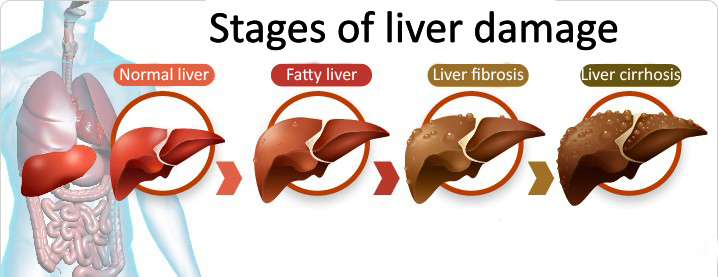
The liver contains a certain amount of fat.
Albeit if a liver contains more than 5-10% of fat, we deal with liver dystrophy (fatty liver). Fatty liver disease is a buildup of excess fat in the liver. Compared to many other diseases of an organ, the fatty liver disease proceeds asymptomatically till a particular stage, and that’s a reason why it’s called “silent disease” of a liver. Mostly it’s revealed when organ is significantly damaged.
Doctor-gastroenterologist (hepatologist) of the clinic “New Life” of National Center of Surgery Magda Asatiani discusses the fatty liver disease.
–Dr. Magda, What kinds of symptoms does fatty liver disease have?
– Upon disease progression, the following symptoms can be detected: general weakness, quick exhaustion, slight, dull pain, and discomfort in the right loin area. In more far-gone cases, it might develop ascites (fluid retention in an abdominal cavity), swelling of legs, itchiness, yellow skin and sclera, lack of appetite and weight loss, nausea, enlarged veins of the abdominal wall (Caput medusa),neurological disorders and etc.
– What causes fatty liver?
–The most common cause of a fatty liver is the excess consumption of alcohol. The cause of non-alcoholic fatty liver disease is unknown, albeit its’ relationship with unbalanced nutrition and low physical activities is established. Quick weight-loss might cause this disease as well. Its link to different health conditions is also established. Existing medical data connect fatty liver with genetic predisposition and disorders. Albeit, some people might develop the disease without mentioned risk factors.
–What happens to the liver during this disease?
–In the first stage of fatty liver disease, excess fat builds up in the liver, which might develop together with inflammation of hepatic tissue (steatohepatitis). With time, scarring of the inflamed liver (cirrhosis), cancer or liver failure might develop.

– Is it feasible to prevent this pathology, and what kind of methods are used for that?
–Prevention of fatty liver disease is feasible with healthy nutrition and regular exercise. According to data, the so-called "Mediterranean diet" is very effective. It’s rich in vegetables, fruits and so-called healthy fats that help decrease cholesterol and triglycerides. The minimal physical activity comprises walking for 30 minutes, five days a week. Weight control plays an important role. In the case of obesity, it’s necessary to reduce your body mass index gradually. It’s recommended to limit alcohol intake and properly observe all pathologies that stimulate disease development.
– Is the disease directly connected to unhealthy nutrition?
–Together with various factors in the development of the fatty liver disease, nutrition plays an important role. Following unhealthy food is connected to this disease: fast-food chains, high calories diet, saturated fats, products high in fructose, beverages containing sugar, so-called western diet. Preference should be given to grilled or baked products (compared to fried ones) and so-called "healthy fats" contained by plant products and particular oils (for detailed recommendations, contact a doctor).
–Which diseases are primarily associated with it?
–Fatty liver disease’s relationship with various kinds of diseases is identified, for example:
- Excess body mass and obesity;
- Diabetes (type II diabetes) or prediabetes;
- High blood cholesterol and triglyceride levels;
- Hypertension;
- Metabolic disorders (metabolic syndrome);
- Certain infectious diseases (hepatitis C)
- Also, the consumption of corticosteroids and various types of anti-cancer drugs and toxic substances.
– What can you tell us about the methods of diagnostics and treatment in the clinic "New Life"?
– Together with specialists’ (gastroenterologist/hepatologist) consultation, first-line tests of fatty liver diagnostic are available in the clinic "New Life." These tests comprise an abdominal ultrasound examination and biochemical examination of a liver. Deviation from the norm requires a more in-depth study (ordered by a doctor). Visit to a specialist is especially necessary for people who have the risk factors mentioned above.
The main principle of disease management is to remove factors causing the disease in the first place. It’s essential to prohibit alcohol (during liver damage, there’s no safe amount of alcohol). To date, there are no drugs that directly treat fatty liver hepatosis. The most effective treatment for this disease is healthy nutrition, an increase in physical activities, and weight loss if the patient is overweight.
Also, it’s recommended to manage all the diseases and conditions that are connected to the development of hepatosteatosis. A doctor's constant supervision is necessary.
Remember, it is feasible to improve the condition of your liver with healthy nutrition, physical activities, and your doctor’s recommendations.
Wish you health!








